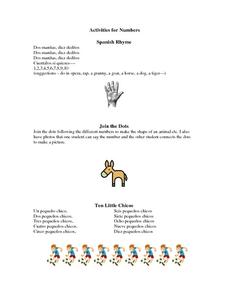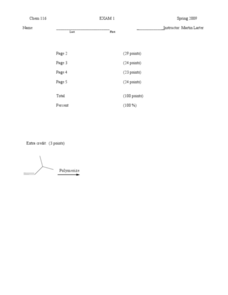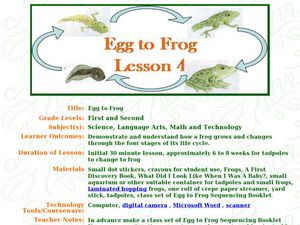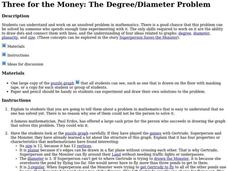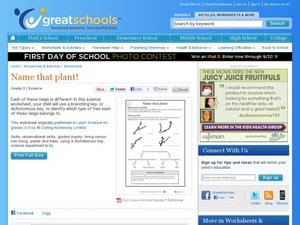Curated OER
Chapter 12 Worksheet - Ions, Ionic Bonding, anc Covalent Bonding
Four pages provide plenty of problem solving practice for chemistry whizzes. They answer questions and write electron configurations for ions. They use Lewis dot diagrams to display equations. Covalent bonds are explored. The last half...
T. Trimpe
Atomic Basics
Get down to basics with these worksheets on the structure of atoms. Challenging young chemists to identify information from the periodic table and create Bohr diagrams and Lewis dot structures for different elements, this...
Nebraska Department of Education
Activities for Numbers
Looking for ideas for teaching numbers to your Spanish class? Try out one or all of these 16 activity ideas!
Curated OER
Organic Chemistry 231, Martin Larter, Exam 1
If you need a straightforward and comprehensive organic chemistry exam, check this one out. Chemistry pupils identify functional groups in molecule diagrams, draw a Lewis structure, fill in a table about molecular shape, predict boiling...
Scholastic
Calligraphy Minibook
Engage young learners in practicing their counting skills while teaching them about the Japanese writing system with this printable book. Using the included key that shows the kanji characters for the numbers 1-10, children...
Curated OER
Chemistry 116 Exam 1, Spring 2009
This five-page exam was designed for a biochemistry and organic chemistry course. It covers the molecular geometry and properties of organic comounds. Test takers identify compounds, functional groups, and isomers. They draw Lewis...
Spark Notes
Review of Chemical Bonding: Review Test
This is an online exercise in which chemistry learners answer a series of multiple choice questions about bonding. Topics addressed include ionic and covalent bonds, electronegativity, ions, valence electrons, resonance structure, and...
EngageNY
Ratios II
Pupils continue the study of ratios by creating ratios from a context. The contexts present more than two quantities, and scholars create contexts that match given ratios.
Houghton Mifflin Harcourt
Unit 8 Math Vocabulary Cards (Grade 4)
Enhance fourth graders' math vocabulary with 17 word cards and their definitions. Learners focus on terms that deal with graphing, such as y-axis, coordinates, plot, and ordered pair in the last set of math vocabulary cards.
Art Institute of Chicago
Color Combinations
Explore color through an examination of pointillism and light. Class members view Georges Seraut's famous painting on a computer, zooming in and out to see the details and effects of the technique. They then cover how light and color are...
Curated OER
2005 U.S. National Chemistry Olympiad - Local Section Exam
National Chemistry Olympiad tests are released after their use each year, since they cannot use them again for this event. The result: outstanding comprehensive assessment resources for general chemistry classes! This 2005 version covers...
Curated OER
Creating Letter-shape Patterns #2
Before learners become writers they need to feel comfortable moving a pencil from left to right in various patterns. Use these exercises to give budding printers some fine motor practice. They complete three patterns by tracing a dotted...
Curated OER
Hands-On Ways to Engage Students during Youth Art Month
Enjoy an artful departure from spring fever through creative art lessons.
Curated OER
Worksheet-Scale Drawing-Unit One
In this scale drawing worksheet, students find the area of a compound shape. Students are presented with a drawing of two different sized rectangles that share one side. They compute the size of each rectangle and add their areas...
Curated OER
A Differentiated Way through Think Dots
Learners examine reasons that led people to explore, identify "West" as defined following Revolutionary War, explain importance of finding natural resources, develop time line of dates and events leading up to Lewis and Clark Expedition,...
Curated OER
Egg to Frog
Students study the life cycle of the frog. For this life cycle lesson set, students listen to a read aloud of Frogs, A First Discovery Book, and make a sequencing booklet that shows the four stages of the frogs life cycle. They observe...
Curated OER
Three for the Money: The Degree/Diameter Problem
Students explore the degree, diameter, planarity, and size of graphs. For this degree, diameter, planarity, and size of graphs lesson, students try to construct a graph with more than 12 vertices that satisfy all other...
Curated OER
Color Dots 2
Students develop simple observations. They observe bleeding of colored inks with water, to understand mixtures, and to make generalized inferences from their observations.
Curated OER
Reading and Writing in the Right Direction
Beginning writers practice writing and reading from left to right using green and red dots. You'll need notecards with a green dot on the left side and a red dot on the right side. Do your learners understand that print moves from left...
Curated OER
Representing Objects with Numbers
Because this step-by-step counting worksheet includes the answers, it may be best used as an all-class warm up. Learners focus on relating objects and numbers as they count five circles and choose which numeral represents the amount. The...
Curated OER
Picture Hunt
Learners draw a dot for each of the ordered pairs on the page. They then connect the dots to see what the completed picture is. There are two problems on this learning exercise.
Curated OER
What Goes on the Missing Die?
Given four equations, young mathematicians determine which number is missing on the blank die in these addition problems. Only numbers 1-6 are pictured, and learners implement more skills as they write the corresponding numbers below...
Curated OER
Net "Working"
Upper elementary and middle schoolers explore the properties of various polygons. They use video, resource links, and engage in hands-on activities in order to construct geometric nets. This fine plan should lead to increased...
Curated OER
Name that plant!
What is a dichotomous key? When your kids ask, hand them a learning exercise like this one, to explain it. They use the key to identify four different trees, based on the budding twigs they've produced. Tip: Have learners extend this...


